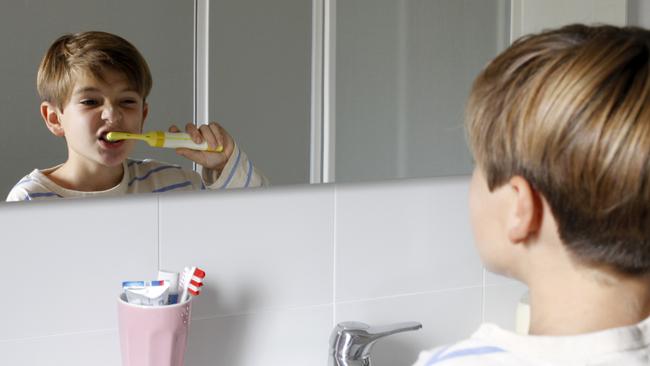Having dental issues as an adult? It probably started at birth
Think baby teeth care is futile – or not a big deal – because they fall out later as adult teeth come through? Think again.

We have all heard parents say that baby teeth care is futile – or not a big deal – because they fall out later as adult teeth come through. Wrong.
Good oral health in childhood is about much more than preserving baby teeth; it’s about building lifelong habits, preventing pain, and ensuring a strong foundation for overall health. Neglecting oral care in the early years can lead to lasting consequences for dental and general wellbeing.
Research shows that the impacts of habits formed in the infant and toddler years reduces the risk of tooth decay as they become older.
Our Kiwi friends have also found some startling and concerning evidence. If you have poor oral health as a child, sometimes no matter how much you try to make up for it as an adult, you suffer the consequences for life. Sadly, tooth decay is irreversible, and any invasive dental procedure performed on your tooth, such as a filling, will eventually fail.
We in the dental world are sadly far too familiar with this.
.
Why ‘baby teeth’ matter
Baby teeth play an essential role beyond helping children chew or giving them a nice smile. These small but mighty teeth allow adult teeth to grow into the correct position, encourage proper jaw development, and promote healthy eating habits. Losing baby teeth too early due to decay or developmental issues can lead to misalignment of adult teeth and, in extreme cases, we must remove all a child’s baby teeth. These complications often result in costly treatments later in life.
Decay or deformed baby teeth can cause pain, infections, and abscesses, disrupting a child’s sleep, school performance, and social interactions. Poor oral health can also negatively impact a child’s confidence.
Abscesses in baby teeth impact the developing adult tooth, causing damage before they emerge. Dental issues are also a leading cause of preventable hospital admissions in children.
While some children require treatment under general anaesthesia for developmental, behavioural, or medical reasons, many hospitalisations could be avoided with earlier intervention.
Premature loss of baby teeth can also cause spacing issues. When a tooth falls out too early, the remaining teeth shift into the gap, leaving little room for the adult tooth to erupt properly. This leads to expensive treatment to correct down the track.

Forming habits that stick
Good oral hygiene habits are best established in childhood. Children who learn to brush, floss, and visit the dental practitioner regularly are far more likely to carry these habits into adulthood. These routines do more than prevent cavities – they lay the foundation for lifelong health. Regular dental visits also build a trusted relationship with the dental team, which can be essential if a child experiences a dental trauma.
Conversely, children who don’t develop these habits early struggle to maintain good oral health later. Dental neglect in childhood can create a “snowball effect,” where problems worsen over time, leading to challenges that are harder to address.
Oral health is the key to good health
Dental decay is the leading cause of oral issues in children, but around one in six children are born with enamel defects – a genetic condition unrelated to hygiene. These defects cause rapid tooth breakdown, leading to problems similar to decay. Early detection allows for less invasive treatment, while delayed care can result in hospital-based treatment for more extensive procedures.
For many people, the significance of oral health in early childhood can be easy to underestimate. This damaging misconception can lead to devastating consequences throughout a person’s life. Good oral health as a child is one of the biggest determinants of oral and general health as an adult – not just inside the mouth cavity but for the whole body, including our mental health.
Oral infections are linked to systemic conditions like diabetes and heart disease. Thousands of children have untreated dental infections that introduce bacteria and inflammatory factors into their bloodstream, potentially impacting their general health. If an abscess on a child’s arm would be treated immediately, why is an oral abscess often overlooked? Sadly, in my world I see several children a day walking around with untreated abscesses. Some of them languish for years on public waiting lists.

Breaking down barriers
Despite its importance, access to dental care remains a challenge for many Australian families. As dental practitioners, we also realise cost-of-living pressures remain high. Children from low-income households are more likely to experience untreated dental issues, with significant social and economic implications.
There is a distinct lack of data on this important issue; the most current statistics on children’s oral health are over 10 years old. If we do not measure the scale of the problem, how can we even begin to enact change? Further compounding the problem, waiting lists in the public system are not reportable and therefore the public is blissfully unaware of the multi-year waits that children suffer.
The advice is simple: children should see a dentist by their first birthday. Early visits can reduce fillings and extractions by about five per child. Many private dental clinics bulk bill under the Child Dental Benefits Schedule, making care affordable for eligible families. However, the scheme is limited and needs reform, as outlined in the 2023 Fifth Review. Eligibility for public dental care also varies across states, so check with your local public dental clinic.
Parents, educators, and policymakers must work together to dispel myths and promote the importance of early dental care. By prioritising oral health from the day we are born, we’re not just preserving smiles – we’re fostering lifelong health.
Dr Tim Keys is a Paediatric Dental Specialist working in public and private practice. He is the head of advocacy and policy for the Australasian Academy of Paediatric Dentistry.
This column is published for information purposes only. It is not intended to be used as medical advice and should not be relied on as a substitute for independent professional advice about your personal health or a medical condition from your doctor or other qualified health professional.




To join the conversation, please log in. Don't have an account? Register
Join the conversation, you are commenting as Logout